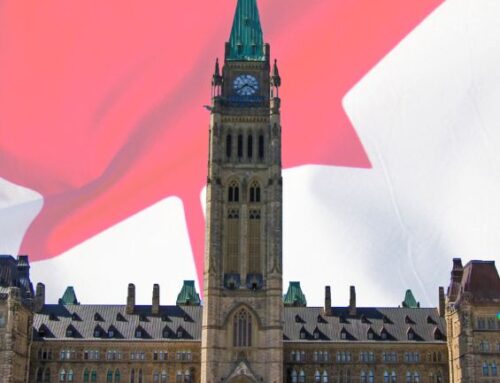There is a joking reference often made over a beer in Queen’s University’s pubs about the increasing number of homosexual and lesbian activists at the university that goes something like this: “They don’t call Queen’s University Queen’s for nothing.”
If taken out of the pubs to the public domain, this tasteless joke would likely have all those who dare to utter it soundly pilloried, harassed and taken to court. And if the joke were made by a student, he or she would undoubtedly be banned from campus.
New codes
The high art of taking offence has become a cottage industry in many quarters. On campus, where new codes of student behaviour are being written, state-of-thee-art superlatives of taking offence have become rampant.
Last year, Queen’s University administration suspended student broadcaster Craig Cornell after he allegedly said offensive things about women and homosexuals on Radio CFRC. Given the high state of sensitively created by lib-left activist in the feminist, homosexual and ethnic communities, in the future any university may be able to suspend students for any infraction, however frivolous.
New enlightenment
The phenomenon is not peculiar to Canadian campuses. An article published in Newsweek at the end of December 1990, “Taking Offence,” asks after reflection on the new human rights in academia, “Is this the new enlightenment on campus or the new McCarthyism?”
The contemporary article chronicles the plight of Nina Wu, a sophomore at the University of Connecticut.
“Perhaps Nina Wu actually didn’t like gays. More likely, she thought she was being funny when she allegedly put up a sign on the door to her dorm listing “People who are shot on sight”—among them, “preppies, bimbos,” “men without chest hair” and “homos.” No protests were heard from representatives of the first three categories, but UConn’s gay community was more forthright in asserting its prerogatives. Wu was brought up on charges of violating the student-behaviour code, which had recently been rewritten to prohibit “posting or advertising publicly offensive, indecent or abusive matter concerning persons. . . and making personal slurs or epithets based on race, sex, ethic origin, disability, religion or sexual orientation.”
Having been found guilty, Newsweek says of Ms. Wu’s fate:
“Wu was. . .what would you guess? Reprimanded? Ordered to write a letter of apology? No, Wu was ordered to move off campus and forbidden to set foot in any university dormitories or cafeterias. Only under pressure of a federal lawsuit did the university let her move back onto campus this year—and revise the Code of Student Conduct to make it conform to a higher code, the First Amendment.”
‘Justice for All’
In Canadian academia, nowhere are homosexuals and lesbians more active than at Queen’s University where last fall Queen’s Law Lesbian and Gays sponsored a conference on lesbian and gay legal issues entitled ‘Justice for All’.
Spokesmen Chris Kendall and Carol Allen said they were ‘dazzled’ when 206 participants registered, when they hoped originally for 60 or 70.
Mr. Kendall said that almost all sectors of the diverse homosexual community were represented. He noted that there were some groups missing, such as “physically challenged” lesbian and gay men, and people from age groups other than 20 to 30 year-old range.
Allen added that for her, “this was the safest weekend as a lesbian I have felt in Kingston.”
MP Svend Robinson, ‘patron saint’ of the homosexual community and long-time advocate of reducing the age of consent, was the chief speaker.
The Queen’s conference, incidentally, was so successful plans are already under way for a second 1991 conference at the University of British Columbia.
New brand of human rights
The 1990s will see the advent of a new brand of human rights on North American campuses. No longer will it be adequate for a student to remember his manners and refrain from insulting homosexuals.
Codes of behaviour will make it incumbent upon the student to affirm the presence to affirm the presence of homosexuals on campus, and to study their literature and ‘culture’ along with their Plato and Shakespeare.
“This agenda,” states Newsweek, “is broadly shared by most organizations of visible minority, feminist and ‘gay’ students.”
Campus radicals
It is also the program of a generation of campus radicals who grew up in the ‘60s and are now achieving positions of academic influence. If they no longer talk of taking to the streets, it is because they have already gained access to the conventional weapons of campus politics: social pressure, academic perks (including tenure) and—when they have the administration on their side—out-right coercion.
The Newsweek article continues “There is no conspiracy at work here, just a creed, a set of beliefs and expressions which students from places as diverse as Sarah Lawrence and San Francisco State recognize instantly as PC—‘Politically Correct’. Plunk down a professor from Princeton, say, in the University of Wisconsin at Madison, show him a student in a tie-dyed T shirt, with open-toed sandals and a grubby knapsack with a dangling student-union-issue, environmentally sound, reusable red plastic cup, and he’ll recognize the type instantly. It’s ‘PC Person’, an archetype that has now been certified in the official chronicles of American culture, the comic pages. Jess Shesol, a student cartoonist at Brown, created him as an enforcer of radical cant, so sensitive to potential slights that he even knows the correct euphemism for 9-year-old ‘girls’. He calls them ‘pre-women’.”
On campuses here as well as south of the border, it’s a strange new brand of social justice that strives for dominance through such tactics as applied pressure, media attention and threats.
‘Take back the night’
In Kinston, feminists overturned a police car on their annual ‘Take Back the Night’ march. They were highly successful in getting newspaper ink about how they were harassed by white male police.
No one from the media, however, asked for identification when feminists and lesbians held the university administration hostage in a well-publicized complaint that the majority of female students at Queen’s felt threatened by male students.
The media, called on to campus for press conferences, were simply told that the women, faces hidden in Ku Klux Klan fashion, were “frightened female university students.” Yet the ringleader, public school board trustee and strident feminist, Pam Cross, had never attended Queens.
Great strength
In her address to the ‘Justice for all’ conference, self-professed lesbian Kathleen Lahey, a Queen’s law professor, spoke about the involvement of lesbians in social change: “Instead of carrying our own bundle, we get involved in feminism, antiracist work, environmental issues, class, struggles, et cetera, long before we take up our own issues. It’s not any great secret that lesbian women are one of the great strengths of the women’s movement, yet, we often feel that our own issues come last or are not issues at all.”
Ms. Lahey noted that in the area of human rights law, lesbian and gays seem to be standing on the brink of a real breakthrough in liberation law.
“In our provinces sexual orientation is now included in human rights legislation and I think that there is some support for the view that lesbian and gay issues are being taken more seriously across the board,” she said.
‘Same-sex couples’
A recent example is the legislation rubber-stamped by the Ontario New Democratic party. At the end of their first parliamentary session, the NDP launched what will be a new era of ‘sexual equality’ for homosexuals. For the first time in Ontario, same-sex couples qualify for job benefits already granted to the heterosexual partners of provincial civil servants.
As of December, 1990 that term ‘spouse’ has been redefined in government benefit policies and extended to include couples who are cohabitating in conjugal or homosexual relationships. In laymen’s language, this means that lesbian and gay spouses of government workers will get extended medical coverage and dental and life insurance. Civil servants will also be entitled to bereavement leave.
And that’s just for starters.
The government will also review and amend a host of provincial laws already on the books if Queen’s Park will extend ‘sexual equality’ across the board.
Meanwhile, higher education, not s long ago the seat of learning and democracy’s main arena for debate, is meandering far away from the ideal of the university.
On many campuses, free expression, once the foundation on which universities were built, now bring suspension and harassment. Going or gone is the core curricula of the liberal arts which made great leaders of students.
Going also is the eloquent language of Shakespeare, now deemed racist and sexist by busy radical feminists, in their place—the ‘politically correct’ and the deconstructionists.
But perhaps most chilling of all is the knowledge that at the university, of all places, tolerance now has to be imposed rather than fostered and taught.




